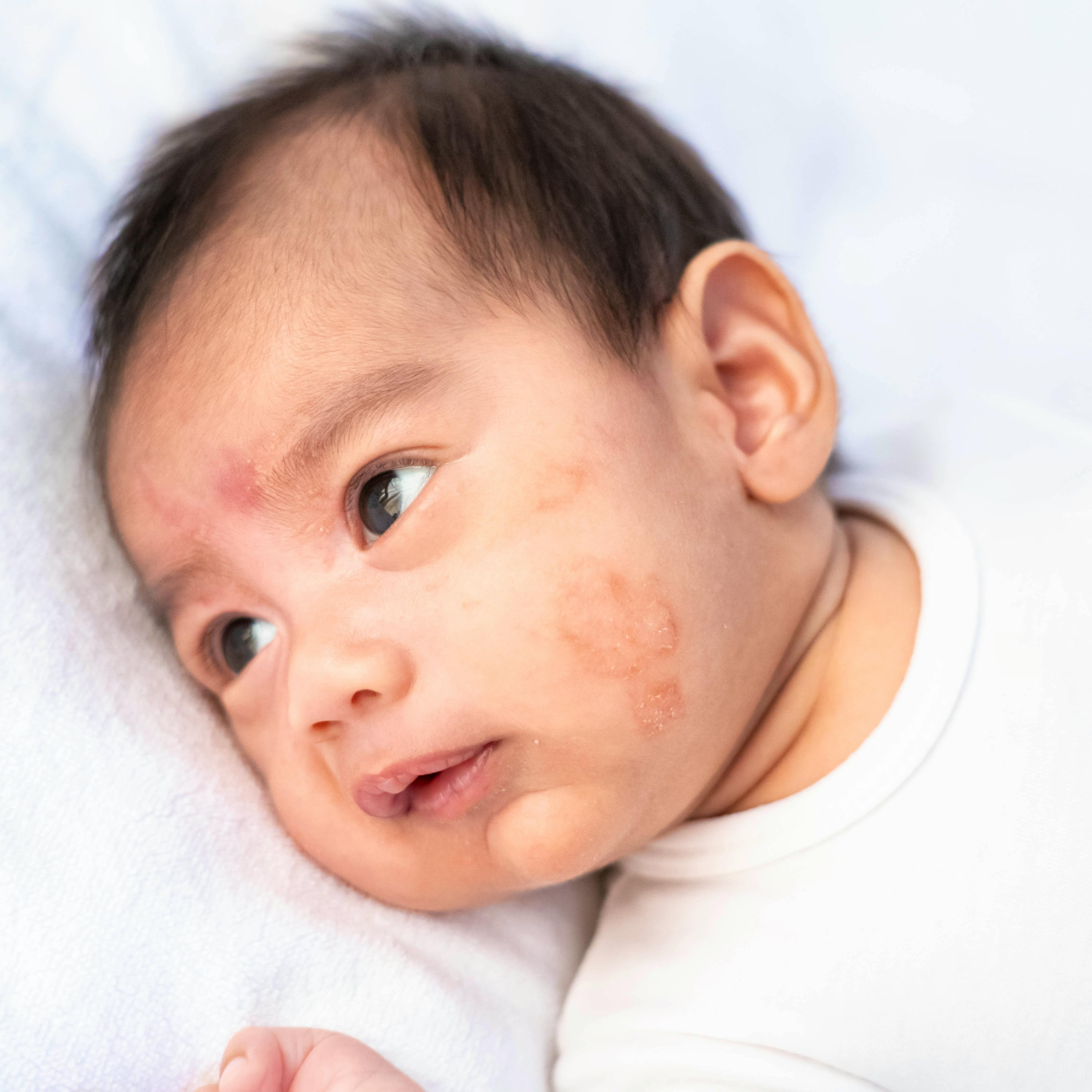Eczema, also known as atopic dermatitis, is one of the most common skin conditions seen in infants and young children. It causes dry, itchy, or red patches that can make your little one uncomfortable, but with the right care, it’s both manageable and often improves with age.
At CLS Health, our pediatricians in Webster and Sugar Land work closely with parents to identify what’s triggering their little one’s eczema and to create gentle, effective treatment plans.
In more persistent or severe cases, your pediatrician may recommend a referral to one of our dermatologists for advanced evaluation and care.
What Is Eczema?
Eczema, also called atopic dermatitis, is a chronic inflammatory skin condition that weakens the skin’s natural barrier, making it more sensitive to dryness, allergens, and irritants. Eczema is not contagious, but children with eczema are at a higher risk of skin infections. Eczema often runs in families with asthma and allergic conditions.
Distinguishing Eczema from Psoriasis
While eczema and psoriasis can look similar, they have different causes and treatment approaches. Psoriasis tends to form thicker, silvery plaques and is less common in infants. A clear diagnosis matters, since treatment options vary, something your pediatrician or dermatologist can help confirm.
Eczema in Infants and Children — What Parents Need to Know
Eczema in infants often appears as dry, itchy, red patches on the cheeks, chin, scalp or arms. You may notice your infant scratching, rubbing, or appearing restless, especially at night when itching can worsen. In preschool and school-aged children, eczema commonly appears in the elbow and knee creases, as well as on the neck, wrists, ankles, and around the eyes.
Common triggers include:
- Fragranced soaps, bubble baths, or laundry detergents
- Rough fabrics like wool or synthetics
- Heat, humidity, or sudden temperature changes
- Environmental allergens like dust, mites, pet dander, or pollens
Eczema is especially common in infants because their skin barrier is still developing and is more prone to irritation.
What Causes Eczema in Infants and Young Children
Eczema usually develops from a mix of factors:
- Genetic tendency: Children with a family history of eczema, asthma, or allergic conditions have a higher risk because of inherited skin-barrier differences.
- Immune system sensitivity: The immune system may overreact to mild irritants
- Environmental triggers: Dry air, temperature changes, detergents, fragrances, pet dander, and other everyday exposures can irritate the skin and cause flares.
Understanding these root causes help guide prevention and treatment.
Eczema Treatments for Infants and Young Children
The goal of treatment is to soothe the skin, reduce itching and inflammation, and prevent flare-ups. Consistency and gentle care make a big difference.
Best Moisturizers
- Use fragrance-free moisturizers or ointments like petroleum jelly or ceramide-rich creams.
- Apply at least twice daily, especially after taking baths.
- Avoid lotions with alcohol or perfumes that can sting or dry the skin.
- Your pediatrician may recommend an over the counter (OTC) option or a prescription barrier cream if symptoms persist.
Natural Remedies
- Oatmeal baths can calm itching.
- Coconut oil may gently hydrate and protect the skin barrier.
- Cool compresses soothe irritated areas.
Avoid unverified “home remedies” or essential oils, which can worsen irritation or trigger allergic reactions.
Prescription Options
If OTC care isn’t enough, your pediatrician may prescribe:
- Low-dose topical corticosteroids for inflammation
- Non-steroid topical medications (like topical calcineurin inhibitors) area especially helpful for sensitive areas such as the face or skin folds
When to See a Dermatologist for Childhood Eczema
Most cases improve with consistent skin care and guidance from their pediatrician. However, a dermatology referral is recommended if any of the following occur:
Eczema is not improving, very severe, frequently infected, affecting sleep, or if you are unsure of the diagnosis.
A pediatric dermatologist in Houston can perform specialized testing and prescribe advanced therapies when needed to help improve your child’s symptoms.
Help Your Child Live Comfortably with Eczema
Managing eczema is about balance, keeping skin moisturized, identifying triggers, and knowing when professional help is needed.
Pediatricians are highly experienced in treating eczema and manage most cases successfully. When eczema becomes more severe, difficult to control, or needs additional tools, a pediatric dermatologist can partner with your pediatrician to support ongoing care, ensuring your child continues to receive coordinated, comprehensive treatment.
Need Expert Eczema Care for Your Infant or Child?
At CLS Health, our pediatric and dermatology specialists work together to help families manage eczema safely and effectively so your baby can stay comfortable, active, and smiling.
Whether your child needs a gentle skincare routine or advanced dermatologic treatment, we’re here to help every step of the way.
Schedule an appointment today with a pediatrician in Webster or Sugar Land to start your baby’s personalized eczema care plan.

